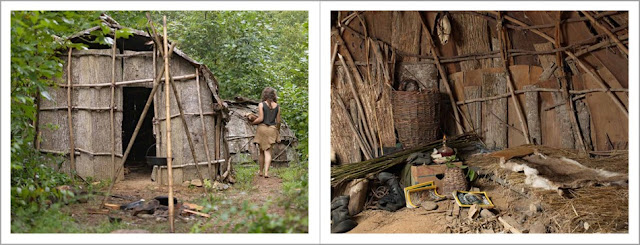 |
| from A Natural Order |
 |
| from A Natural Order |
Photography has always found an interest in alternative
lifestyles. From addicts to gypsies or American men seeking escape, the medium
has fostered an audience of voyeurs enamored with a split from the normal.
Foglia's book travels alongside this lineage of photographs exposing what is often hidden; in this case, people who choose to live off the land and away from an
existence in overcrowded cities. But this book is also about personal
responsibility, responsibility for the land and ourselves as a race of people.
It touches on the importance of the food we eat, the way we grow or kill it and
the impact this has on community and the larger culture. So interests aside,
Foglia has also made a body of work that is important in its relevance.
 |
| from A Natural Order |
The photographer himself grew up in a household that was reliant on itself. Within his New York City suburb, Foglia's family grew and canned their own food and heated their house with only wood. As he states, "by the
time I was eighteen we owned three tractors, four cars and five
computers." His experience is a good example of a lifestyle quickly
catching on across the United States, one that aligns itself with a back to
nature attitude, but also takes advantage of the modern world's many advances.
The artist's upbringing inspired this project, although Foglia's interest was to
seek out those who were fully self-sufficient. He states that he found most of
those he befriended during his four-year venture weren't dissimilar in lifestyle to his
parents' down home perspective. And while the subjects in this book are far
removed from larger urban populations, they are certainly connected to the
larger world through their own blog and laptop powered by solar panels or car battery.
 |
| from A Natural Order |
It's easy to reject the world for its flaws, but doing it in
a healthy way benefits us all. This book hints at that inspiring attitude. It's
an attitude that acknowledges some human advances as important, but also gives
thought to past achievements as maybe being more beneficial to cultural
advancement. It's a book about progress, evolution and an exploration into the idea
of a healthier human condition.
One last note. Along with the book is a separate zine that is reminiscent of a turn of the century self-help pamphlet. I could take or leave the text in the accompanying zine -- it's a little boring, but I really enjoy the illustrations that go along with the text. By including this additional imprint, the zine takes the project slightly further away from a traditional documentary and gives it the quirky edge included in a lot of contemporary photography projects. My only critique is I would like to see this zine slipped into the back of the book, not loosely placed to the side. The two publications are aesthetically and conceptually far enough apart that each could easily be sold separately. -- Antone Dolezal
purchase A Natural Order
One last note. Along with the book is a separate zine that is reminiscent of a turn of the century self-help pamphlet. I could take or leave the text in the accompanying zine -- it's a little boring, but I really enjoy the illustrations that go along with the text. By including this additional imprint, the zine takes the project slightly further away from a traditional documentary and gives it the quirky edge included in a lot of contemporary photography projects. My only critique is I would like to see this zine slipped into the back of the book, not loosely placed to the side. The two publications are aesthetically and conceptually far enough apart that each could easily be sold separately. -- Antone Dolezal
purchase A Natural Order








